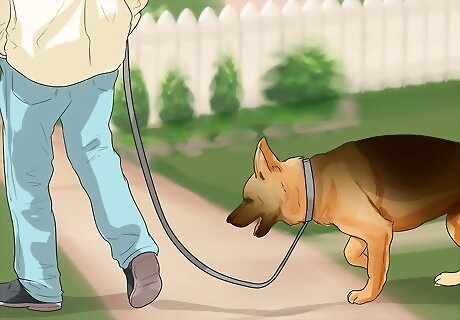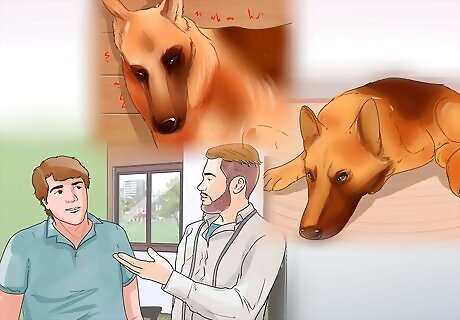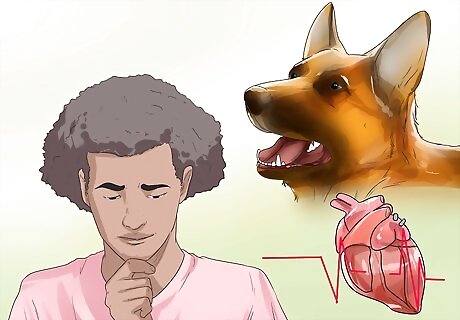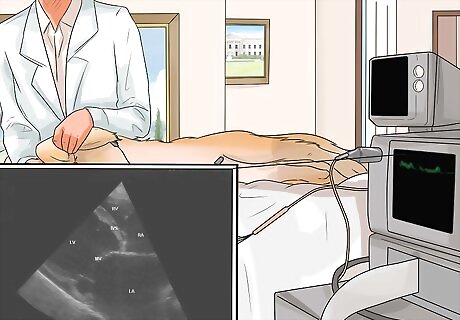
views
Recognizing Symptoms of Heart Disease

Listen for coughing. Pay attention if your German Shepherd coughs for more than a few days. You may notice that the coughing is worse at night or when he's resting. Coughing is usually caused by fluid buildup in the lungs. Coughing may also be a result of an enlarged heart pushing up on your dog's windpipe.

Watch for shortness of breath. If your dog is short of breath because of a heart condition, he'll breathe quickly. The lungs may be filled with fluid and his breaths may seem shallow and rapid. This is because the ability of his lungs to absorb oxygen is compromised. Normally, a large-breed dog takes up to 25 breaths a minute at rest.

Notice when your dog can't exercise. If you take your dog for a run, check to see if he lags behind. The increased demands on the heart to pump blood throughout the body will cause your dog to slow down or even faint when he exercises. You should also check his heart rate to see if it's racing. German Shepherds should have a heart rate of around 80 to 120 beats a minute. If your dog's heart is beating faster than this, it's considered to be racing, especially if he's not exercising at the time.

Look for changes in behavior. In addition to not being excited about exercising, your German Shepherd may seem lethargic. This is because his heart is putting strain on the rest of his body to function. Your dog might not want attention and may even seem depressed. For example, your once playful dog may suddenly want to be on his own and resist going for walks.

Feel your dog's belly. Look for a swollen and enlarged abdomen which is a sign that fluid is building up in the belly (distended belly). This fluid accumulates because the right side of the heart is struggling. You may also notice the membranes in your dog's mouth look blue or purple, instead of healthy pink.

Monitor your dog's weight. It's always important to watch for any weight loss or gain in your German Shepherd. Weight loss might be caused by your dog losing his appetite because of an underlying medical condition (like heart disease). Weight gain may also be caused by heart disease, even if it's less likely a symptom. It may be hard to tell if your dog has gained weight or is experiencing edema. Edema happens when your dog's tissues swell.

Look for severe signs of heart disease. Severe symptoms of heart disease in a German Shepherd may appear with no warning. These include fainting, collapse, or even sudden death. These may happen if your dog's heart can't pump enough blood to his brain. If your dog faints, the veterinarian may be able to prescribe medication to make his breathing easier. Don't wait to get medical treatment for your German Shepherd.
Getting a Medical Diagnosis

Know when to get medical attention. If your German Shepherd has any symptoms of heart disease, take him to see the veterinarian. It's best to catch heart disease early on so you have more treatment options. Your veterinarian may recommend that you take your dog to a specialist for a specific diagnosis. Since heart disease symptoms are similar even for a variety of diseases, it's important to get a proper diagnosis.

Get your dog examined. The veterinarian will do a physical exam to check your German Shepherd's general body condition. Specifically, the vet will check your dog's pulse and use a stethoscope to listen to his lungs and heart. The vet will listen for heart murmurs which are caused by abnormal blood flow in the heart and for heart rhythm. The vet will try to identify where the heart murmur is loudest. This can help determine what's causing the abnormal blood flow.

Get a blood test. If the vet hears no heart murmur or irregular heartbeat, but suspects heart disease, your dog may need a proBNP blood test. This test shows the levels of a certain heart protein in your dog's bloodstream. The higher the level means your dog's heart is distressed. If your dog has low levels of proBNP, this can rule out heart disease.

Do additional testing. If the vet does hear an irregular heartbeat, your dog may need an electrocardiogram (ECG). This records the electrical activity in the heart which is interpreted alongside an ultrasound scan of the heart. This way, the vet can check the electrical activity against a picture of your dog's heart to see how the heart valves close. The vet can measure the thickness of the heart walls and check for tumors or abnormalities within the heart. A skilled ultrasonographer can also see abnormal blood vessels or recognize blood vessels that are narrower than they should be. This can help make a diagnosis. The ultrasonographer can also use a color-mode on the scan to watch the flow of blood through the heart. This helps identify where blood is flowing incorrectly and in what volumes.
Understanding Types of Heart Problems

Consider if your German Shepherd has aortic stenosis (AS). Your German Shepherd may have a hard time pumping blood throughout his body if his aorta is deformed. The aorta is the main artery leaving the heart. If the valve into the aorta is narrowed, as in AS, a backpressure is created in the heart making your dog work harder to circulate blood. Medication is the most common treatment for AS, which treats the irregular heart rhythm.

Think about whether or not your dog has heart defects. Your German Shepherd may have a heart deformity that's causing a heart murmur or another health condition (like problems eating or with blood circulation). These deformities may include: Patent ductus arteriosus (PDA): This is a temporary blood vessel in a fetal puppy that should close shortly after he's born. If it stays open, blood may bypass your dog's lungs. Vascular ring anomaly (also known as persistent right aortic arch): This is another blood vessel that should close before your dog is born. If it stays open after birth, the vessel traps your dog's esophagus which makes it hard for him to swallow food down into his stomach. Mitral or tricuspid valve disease: These valves separate the heart's atria from the ventricles. If they don't fit perfectly together, then blood can leak in the wrong direction, causing a heart murmur.

Think about if your dog has cardiomyopathy. If your dog has abnormalities in the heart muscle itself, he may have dilated or hypertrophic cardiomyopathy. With Dilated cardiomyopathy (DCM), the heart muscle tires and becomes baggy. With hypertrophic cardiomyopathy, the heart muscle thickens, causing the chambers to get smaller and hold less blood. Treatment usually focuses on improving your dog's diet and exercise habits, regulating the heart rate, and improving contractility.

Consider if your dog has a tumor. German Shepherds can develop a vascular tumor (hemangiosarcoma) that can develop in vessels associated with the heart. This tumor usually isn't noticed until it interferes with the heart function. Your dog may have abdominal swelling, irregular heartbeat, and anemia.




















Comments
0 comment